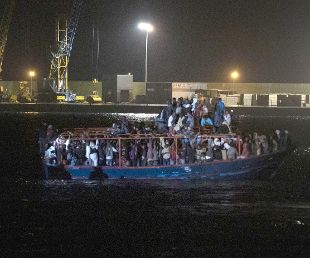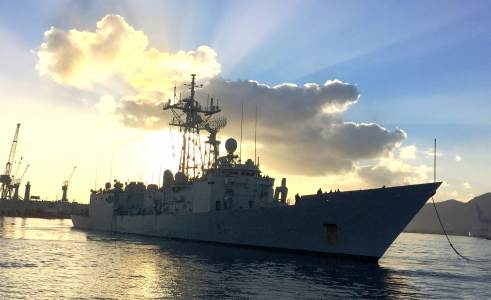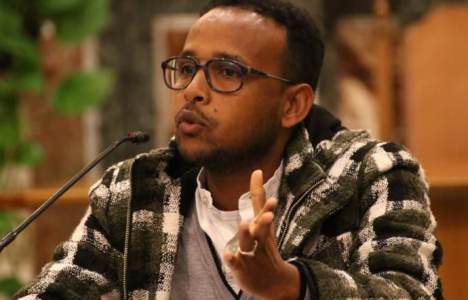Everyone Sit Down Please
It’s not just a line for children, but also the position lived out by migrants while on board the rescue ships, while waiting their identification at the port, while in the police station for their finger prints to be taken. Sat on the ground so that we can watch over them from above. We who decide their fate.

The Diciotti at Palermo. Photo: Alberto Biondo
There will always be a sense of superiority at every landing, and it will have been as such at Lampedusa on July 30th, when 120 people arrived in unstable health conditions (above all the women) due either to their experiences in Libya or during the voyage. Women in tears, men in silence. 120 Nigerians touched ground and were immediately taken to join the large number of people already present in the Imbriacola hotspot. We still do not know if a less cruel fate has been reserved for them that their co-nationals who were immediately sent back to Nigeria last week.
Faced with the 655 people disembarked in Palermo on the Diciotti, the forces of law and order will have also found a sense of superiority in welcoming the new arrivals. The order handed down by one of the officers to his deputies – “Take one each and don’t let go of him for any reason whatsoever” – was clear. It referred to the “result” of the investigative work undertaken by officers on board the Diciotti immediately after the rescue operation. The specialist police unit from Palermo (assisted by the Guardia di Finanza and the Coast Guard) had, by the end of the landing operation, taken hold of 12 presumed people smugglers/boat drivers, and 24 witnesses. Witnesses who will, as usual, be held in Emergency Reception Centres in isolated areas of the province of Palermo.
During the initial port operation, the Frontex agents – who by now have their own desk to one side, away from the other European agencies – are often joined by the police mediators, who have filled in an important role in the pre-identifications carried out on the quay. In this phase, the queuing or sat-down migrants wait to fill in a form, which seems to have turned into a mere formality given that, according to the dozens of people we spoke to, it has been reduced to simply a request for name, surname, place and date of birth. The rest of the form is filled out by the officer on shift, who crosses a box relating to the reasons for the journey. ‘Asylum’ as a reason for having left one’s country appears very little, including in the forms held by migrants aided and informed beforehand by workers from the UNHCR.
Among the recent arrivals there are also some nuclear families of Syrian nationality who, together with both men and women (400 in total) were taken in turn to the Hotspot at Milo, which yet again this week will go over its maximum capacity, given that there are 100 people from the last landing still at the centre, following the transferrals and repatriations of the Egyptians, among whom there were entire nuclear families with minors.
Additionally, as far as we know, for the first time the Trapani Hotspot now has, for those who refuse to provide their fingerprints, despite the practices of best practice by the Prefecture and the managing body, a zealous police officer who has got the idea of using physical as well as psychological violence to take them.
A hundred and fifty of the migrants who arrived in Palermo were transferred to Messina in the morning, seemingly to the Palanebiolo stadium/tent-city or to the former Bisconte barracks, while the others were taken to Campania.
The 32 North Africans present among the passengers (from Tunisia, Egypt and Morocco) were taken to the police station for identification. Among them was one woman. Without doubt, they will not have been provided any possibility of requesting asylum, and the period of waiting will have been spent on the ground in the police station foyer, awaiting an almost certain destiny, at least for the Moroccans (given the lack of places in the CIE*), while for the Tunisians and Egyptians the intermediate destination will be the Falcone Borsellino airport, on route for Tunisia or Cairo.
The exact same fate was held in store for the 28 Tunisians intercepted near Pantelleria yesterday. After having been rescued from the water, they were taken to the Trapani Hotspot while waiting for the plane booked for next Thursday from Palermo to Tunisia.
Finally we turn to the minors included in the group of 655 people – 30 in total – held at the port and then the police station, waiting for a bureaucracy which is still not set up to provide them with any dignity. For them too the waiting period was long, for the OK from the Minister of the Interior for the minors’ transfer (14-18 years old) to North Italy. Thirty two minors, in the end, were transferred to Bologna, for the first time, activating Morcone’s decision on territorial redistribution of unaccompanied foreign minors.
The evening arrives, the floodlights are switched off, only broken shoes, wet clothes and leftover food remain on the ground, save for the migrants awaiting the second round of transferrals to the Milo Hotspot – who, with the utmost dignity, decided to pick up all the rubbish in a huge rubbish bag, making the yard to which the police had assigned them a bit more liveable, probably to tell us that, despite have been made to sit on the ground, they want to live and be a part of this world.
After thanking them for their lesson in civility, we returned to our Sunday in Palermo at the end of July, made up of dirty beaches and waste-strewn yards.
Alberto Biondo
Borderline Sicilia
Project “OpenEurope” – Oxfam Italia, Diaconia Valdese, Borderline Sicilia Onlus
* CIE: Centro di Identificazione ed Espulsione: custody to secure deportation
Translation by Richard Braude







